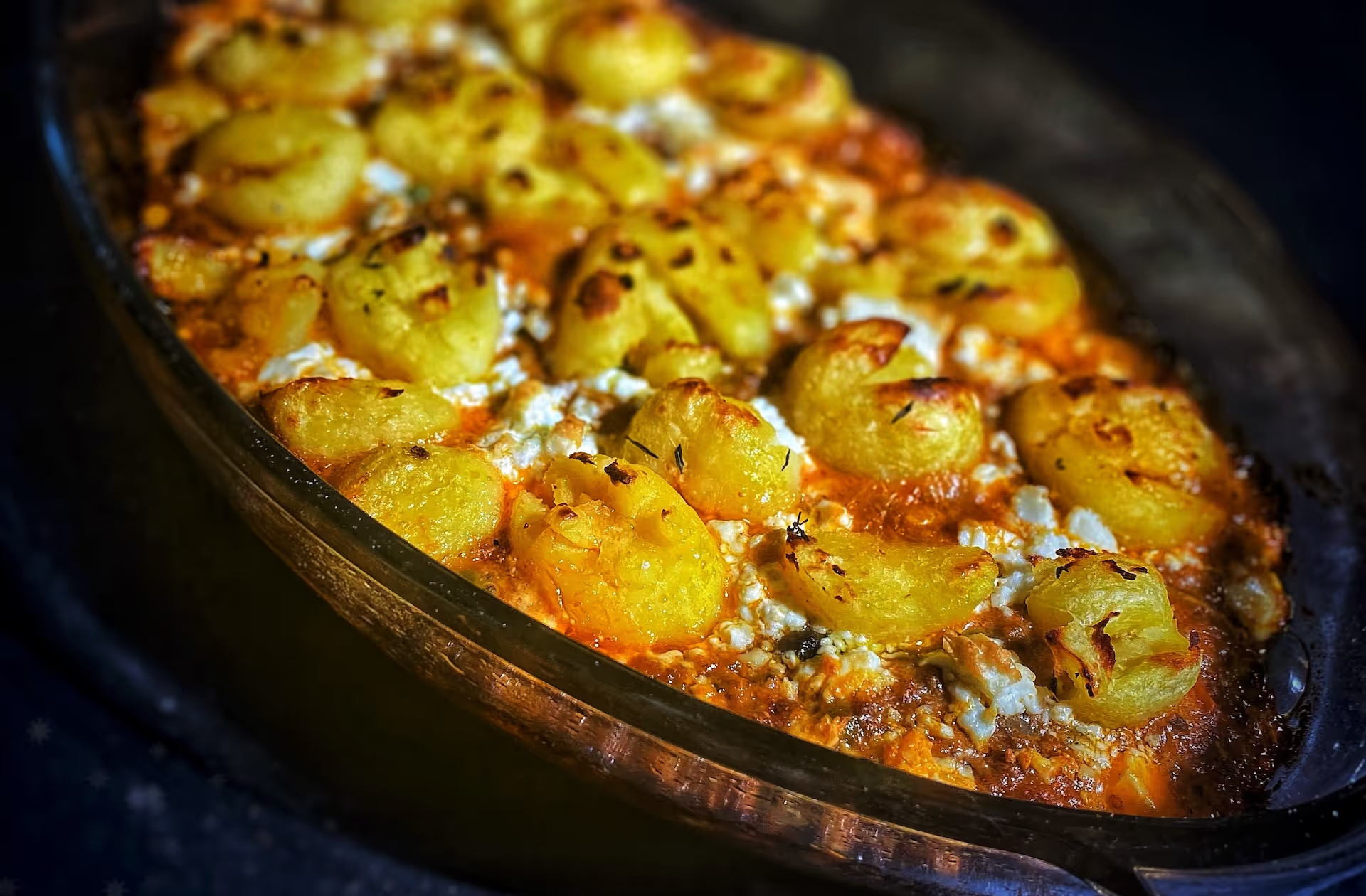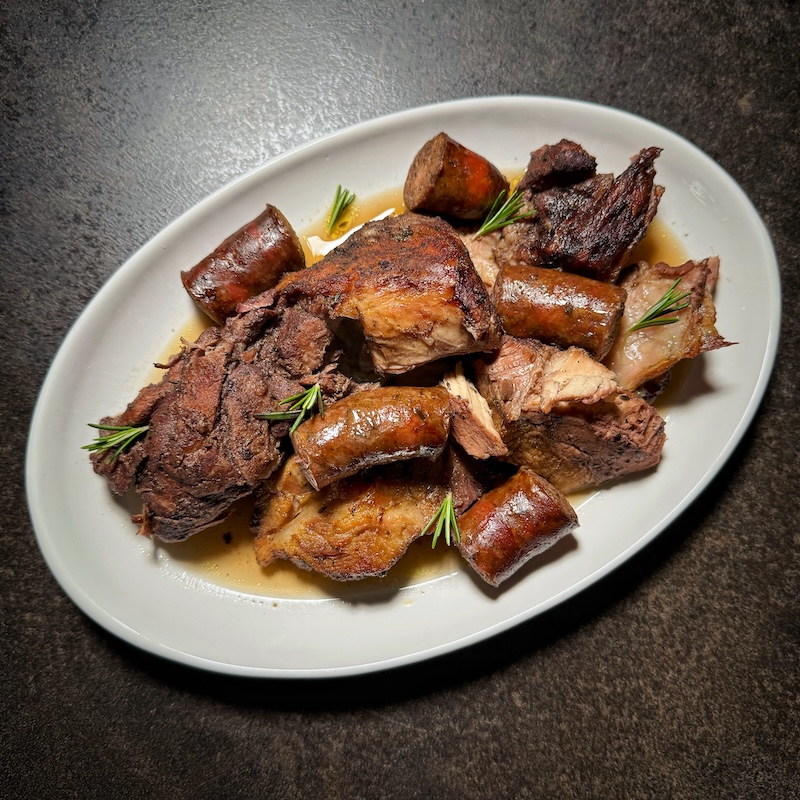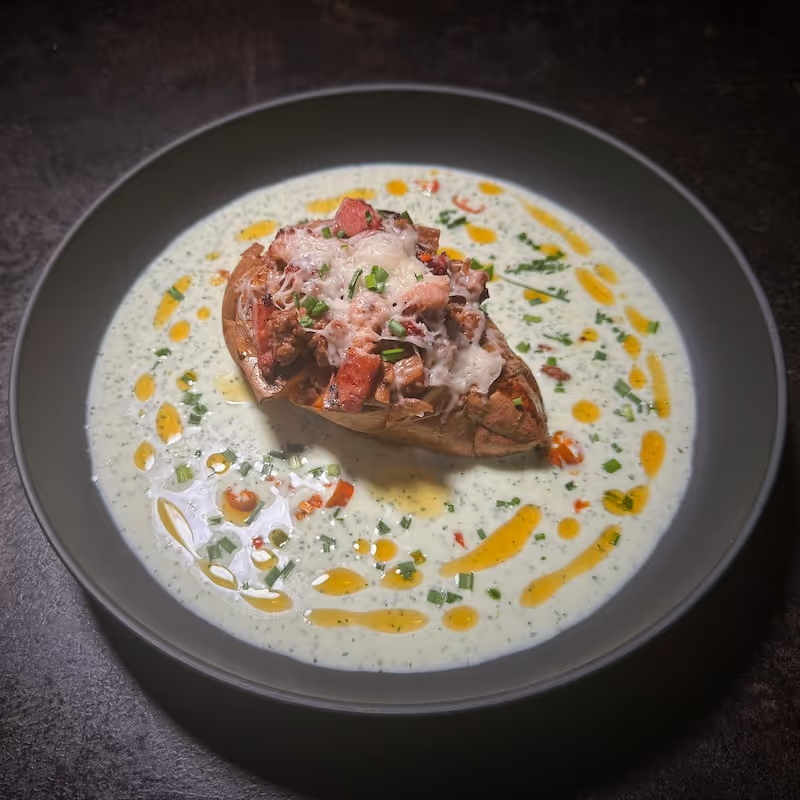This is Not a Moussaka Recipe
Reinvented moussaka recipe with potatoes, pork, and a creamy sauce. Easy to make and deliciously comforting. Check out the full recipe and video!
Servings
Prep Time
Cook Time
Ingredients
Total Time
Ingredients
For the Ragu:
- 1 medium-sized onion, diced
- 1 tbsp olive oil
- 300g minced pork (preferably from pork shoulder)
- 1 carrot, roughly chopped
- 125ml dry vermouth
- 2 tbsp tomato paste
- 1 tbsp paprika
- 1 tbsp garlic powder
- Salt and pepper to taste
- 1 cup whole milk
- 1.5 cups vegetable stock
- 1 cup frozen peas
For the Potato Layer:
- 1-2 potatoes, thinly sliced
- Salt and pepper
- 1 tbsp fresh thyme
- 1 tbsp olive oil
For the Sauce:
- 50g butter
- 2 tbsp all-purpose flour
- 2 cups milk
- 1/4 tsp nutmeg
- Salt and pepper
For the Topping:
- 4-5 baby potatoes, boiled and smashed
- 50g feta cheese
- 1 tbsp olive oil
Equipment
- Cast iron skillet or pot
- Oven-proof dish
- Saucepan or double boiler
Instructions
Moussaka is a dish that transcends borders and brings comfort to many tables worldwide. And even though this is a reimagined version, I promise you it will keep you intrigued and satisfied, showcasing flavors that are both familiar and delightfully unexpected. In other words, while this is not your traditional moussaka, it is a hearty and delicious dish that will surely become a favorite in your kitchen. So let's begin! Just keep in mind that the pictures were taken for a party batch.
How to make this moussaka
Step 1: Preparing the Ragu
- In a cast iron skillet or pot, cook the diced onion for 3-4 minutes on medium heat in 1 tbsp olive oil.
- Add 300g minced pork and cook for 5-6 minutes on medium heat, stirring occasionally.
- Add the chopped carrot, stir, then add 125ml dry vermouth.
- Stir and cook for 10 minutes on low heat, allowing the alcohol to evaporate while retaining the flavor.
- Add 2 tbsp tomato paste, 1 tbsp paprika, 1 tbsp garlic powder, salt, and pepper to taste.

- Stir to combine, then pour in 1 cup whole milk and 1.5 cups vegetable stock.
- Gently stir to combine and cook on low heat for 1.5-2 hours.
- When the liquid is almost reduced, add 1 cup frozen peas, stir, and cook for 2 more minutes.

Step 2: Preparing the Potato Layer
- Thinly slice 1-2 potatoes and add them to an oven-proof dish. Season with salt, pepper, and 1 tbsp fresh thyme.

- Drizzle with 1 tbsp olive oil, combine everything, and bake at 180 degrees Celsius for 30 minutes.
Step 3: Making the Sauce
- In a saucepan on low heat or a double boiler, melt 50g butter.
- Add 2 tbsp all-purpose flour and stir to combine.

- Slowly pour in 2 cups milk, stirring constantly until it thickens slightly, aiming for a saucy texture rather than a custardy one. This should take about 5 minutes.
- Once the desired texture is reached, season with 1/4 tsp nutmeg, salt, and pepper.
- Combine the sauce with the ragu, saving 2 tbsp for later use.
Step 4: Preparing the Topping
- Boil 4-5 baby potatoes until fork tender.
- Place them on a chopping board and smash them thoroughly using a potato masher, chopping board, plate, or whatever you prefer. Just ensure they are well smashed.
Step 5: Assembling the Dish
- Transfer the ragu over the pre-baked potatoes. Drizzle the remaining sauce, top with 50g feta cheese.

- And then add the smashed potatoes.

- Drizzle 1 tbsp olive oil and bake at 200 degrees Celsius for 30-40 minutes.
- Once the top potatoes are crispy and golden, remove the dish from the oven and let it rest for 10 minutes before serving. Sprinkle with some fresh thyme and enjoy.
Ingredient Insights and Nutritional Benefits
Now, let me tell you why I chose these ingredients for this recipe.
First of all, the combination of pork, carrots, and peas creates a hearty and balanced meal rich in protein, vitamins, and fiber. On the other hand, the use of vermouth adds a sophisticated depth of flavor, while the tomato paste and spices bring warmth and complexity.
The creamy sauce ties everything together, making each bite comforting and indulgent. And the star of the recipe, potatoes provide a satisfying base and topping, making this dish a wonderful source of carbohydrates and essential nutrients.
Differences Between This Recipe and Classic Moussaka
Unlike traditional Greek moussaka, which typically features layers of eggplant and béchamel sauce, this version uses potatoes and a different style of sauce.
The incorporation of vermouth and a vegetable stock-based ragu offers a unique twist, providing a fresh take on the classic moussaka recipe with potatoes.
Hence, it is safe to say that this easy moussaka variant is less time-consuming and still delivers a delicious, comforting meal.
Frequently Asked Questions
Here are some common questions about moussaka and our unique recipe:
Q: Who invented moussaka?
A: Moussaka is believed to have been introduced to Greece by Arab traders in the Middle Ages, with its roots tracing back to the Levant.
Q: Can moussaka be frozen?
A: Yes, moussaka can be frozen. Ensure it is cooled completely before wrapping it tightly in plastic wrap and aluminum foil. It can be stored in the freezer for up to three months.
Q: Can moussaka be made ahead of time?
A: Absolutely! You can prepare the entire dish ahead of time and refrigerate it. When ready to serve, bake it at the specified temperature until thoroughly heated and the top is crispy.
Q: What to serve with moussaka?
A: Moussaka pairs well with a fresh Greek salad, crusty bread, or a side of roasted vegetables. These sides complement the rich flavors of the dish perfectly.
Conclusion
This being said, it is safe to say that this reinvented potato moussaka is a testament to how traditional recipes can be adapted and transformed into new, exciting dishes while still paying homage to their origins
Therefore, I hope you will test this dish and tag us along when you do. The full video of the recipe is available on YouTube, so check it out and don’t forget to like and subscribe.
Enjoy your cooking journey and savor each delicious bite!
Nutrition Facts / Serving
- Calories 731
- Total Fat 36 g
- Cholesterol 103 mg
- Sodium 1151 mg
- Potassium 1359 mg
- Total Carbohydrate 64 g
- Sugars 17 g
- Protein 31 g




.svg)







